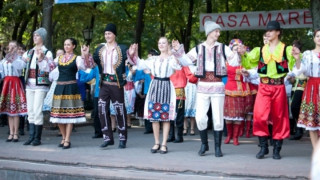Treatment of Minorities

During the monitored period, there were practically no monitoring surveys of this category in Moldova. However, there is some information that can be used to indirectly judge the level of nationalism in the country. These are surveys on the most painful topic - the question of attitude to the state language issue.
There is no disagreement on the question that the language of the title majority is state, given that the Russian language was originally given the status of a language of interethnic communication. Battles are conducted on how to name the state language - Moldovan or Romanian. Historically, people who consider the language they speak Romanian are active supporters of reunification with Romania and the violent assimilation of minorities. And vice versa.
The only poll, commissioned by the Public Policy Institute with the support of the Soros Foundation, was devoted to the question of amendments to the Constitution regarding the change of the state language from Moldovan to Romanian. Changes were supported by 22.7% of respondents. 65% of Moldovan citizens who participated in the survey were against the change. Approximately 7.6% of the respondents believed that the Constitution must specify Moldovan language as the state language, and Romanian should be placed in parenthesis. At the same time, 2% of respondents were in favour of the Constitution not specifying the state language at all. In general, most of the population of Moldova does not support unification with Romania, although the Romanians are considered to related to them.
In 2021 CIVIS Center for Sociological, Political and Psychological Research and Analysis (CIVIS Center) published a Research on the state of interethnic relations in Moldova for the period of 2020. The study was carried out with the support of the Office of the High Commissioner on National Minorities of the Organization for Security and Cooperation in Europe (OSCE HCNM) with the aim of assisting the Government of the Republic of Moldova in the implementation of the Strategy for the Consolidation of Interethnic Relations for 2017-2027 and the associated Action Plan for 2017-2027. 2020.
The study entitled "Ethnobarometer. Republic of Moldova - 2020" identified the Roma people as the most discriminated group. They are followed by Russians, Gagauz and Ukrainians. The cases of discrimination mentioned were most often related to employment and health care. In particular, 48% of Roma experienced discrimination in employment, 25% of Russians, 16% of Gagauz and 15% of Ukrainians. Interestingly, ethnic Moldovans are more likely to be discriminated against in employment (11%) than ethnic Romanians (10%).
In the field of healthcare, 41% of Roma, 15% of Russians, 18% of Gagauz, 14% of Ukrainians, 11% of Moldovans and 8% of Romanians were discriminated against. It is important that in the area of public services, where discrimination is in principle minimal, 31% of Roma representatives nevertheless stated that they were also discriminated against. Moreover, the majority (91%) of Roma believe that ethnicity is the reason for their discrimination, the majority of Gagauz, Moldovans and Bulgarians (35%) - corruption, the majority of Russians and Ukrainians (61%) - language.


